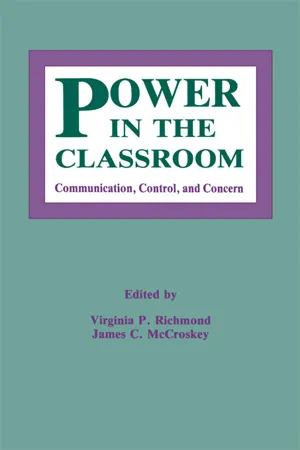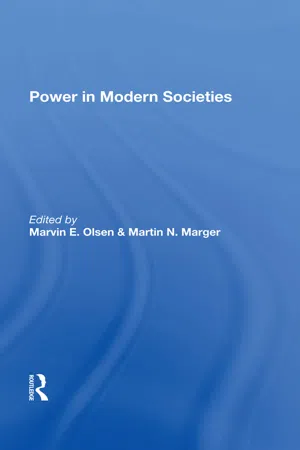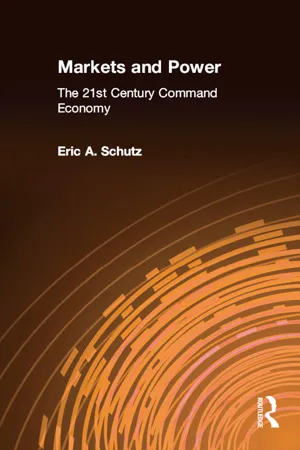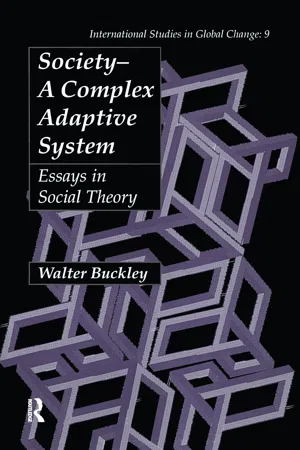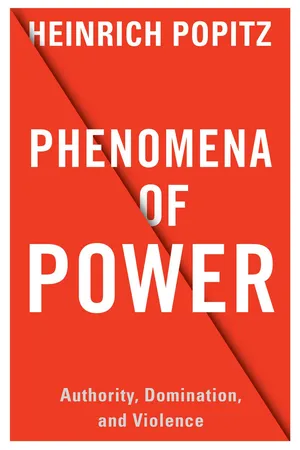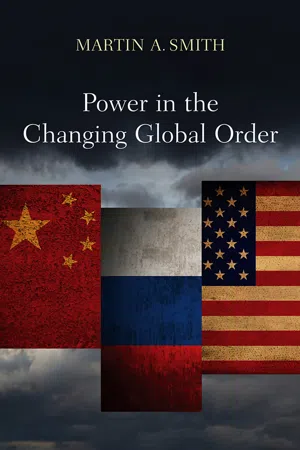Social Sciences
Power and Authority
Power and authority are concepts that refer to the ability to influence or control others. Power is the capacity to enforce one's will, while authority is the right to do so. Power can be exerted through various means, such as coercion or persuasion, while authority is typically derived from a formal position or social structure. Both concepts play a crucial role in shaping social relationships and institutions.
Written by Perlego with AI-assistance
Related key terms
10 Key excerpts on "Power and Authority"
- eBook - ePub
Power in the Classroom
Communication, Control, and Concern
- Virginia P. Richmond, James C. McCroskey(Authors)
- 2012(Publication Date)
- Routledge(Publisher)
CHAPTER 1Power and Control:Social Science Perspectives
Robert A. BarracloughUniversity of New MexicoRobert A. StewartTexas Tech UniversityThe meaning and implication of power has been both a fascinating and mysterious topic of discussion for thousands of years. Mysterious, very largely because people have never truly understood what power is, where it comes from, and how it works.-Lawless, 1972, p. 230T he subject of power, of interest to people for millenia, has been on the social science agenda for at least the last 100 years. George Simmel, the father of American sociology, suggested in the late 1800s that the exercise of power among people was a central issue deserving of study and understanding (Simmel, 1896). Russell (1938) wrote of power as the fundamental concept in social science, “in the same sense in which Energy is the fundamental concept in physics” (p. 10). Lewin felt that “Not the least service which social research can do for society is to attain better insight into the legitimate and non-legitimate aspects of power” (Marrow, 1969, p. 172). Mannheim (1950) argued that “Power is present whenever and wherever social pressures operate on the individual to induce desired conduct” (p. 46). Kornhauser (1957) wrote of “one most important—and in my judgment greatly under-emphasized —aspect of the relations of social science to society, namely, questions of social science in the context of the power structure” (p. 187). Writers from sociology, psychology, communication, management, politics, organizational behavior, and other disciplines have continued to stress the centrality of power to any explanation of the human experience.For all that effort, the first, and perhaps most obvious, conclusion one draws from an attempt to review the subject is that there is a consistent lack of agreement about the nature and parameters of social power and influence. According to Pfeffer (1982), “Power is one of the more controversial of the social science concepts” (p. 64). Perrow (1970) concluded that the subject was clearly “the messiest problem of all” (p. ix). - eBook - ePub
- Shaun Best(Author)
- 2001(Publication Date)
- SAGE Publications Ltd(Publisher)
2
Power, Authority and the State
Area Goals
By the end of this area you should:- Be aware of Anthony Giddens’s conception of modernity
- Have a critical understanding of the distinction that Max Weber made between authority and coercion
- Have a critical understanding of the three types of legitimate rule outlined by Max Weber
- Be familiar with the contribution of Michel Foucault to our understanding of Power and Authority
- Be familiar with Jurgen Habermas’s contribution to our understanding of the processes of legitimation within social systems
- Be familiar with the contribution of Richard Sennett to our understanding of authority
- Understand the postmodern conception of the state
- Be familiar with the nature of state-centred theories
Understanding how some people effectively control the actions of others is one of the central questions in sociology. This is the question of power or domination. The central questions in the sociology of politics are ‘How is power exercised?’ and ‘By what means is power made right, just or legitimate?’ Authority, whereby people are seen to have a legitimate right to control the behaviour of others, is also an important concept in political sociology. The meaning of Power and Authority has been summarised by Steven Lukes (1978). Lukes explains that, central to the idea of power is the notion of ‘bringing about consequences’, not unlike, for instance, the way in which your sociology teacher ensures that people in the class hand in their homework. This is about securing compliance, and compliance can be secured by the use of force or by people choosing to surrender to others. When people choose to accept the will of others as legitimate or right, we can describe the relationship as one of authority You might want to reflect upon the different forms authority takes in our lives: religious authority, moral authority, academic authority, etc. - eBook - ePub
Who Rules America?
The Corporate Rich, White Nationalist Republicans, and Inclusionary Democrats in the 2020s
- G William Domhoff(Author)
- 2021(Publication Date)
- Routledge(Publisher)
Chapter 1 Concepts, Definitions, and Power Indicators DOI: 10.4324/9781003231400-2 This chapter provides general definitions and empirical findings relating to concepts concerning power. It presents an overview of the four main organizational networks that are the basis for the power arrangements that exist in all societies and explains how they interact in the United States. The paradoxical social psychology of power is introduced. The concept of “class” is also introduced, and its two dimensions, economic and social, are discussed. Traditional American perceptions of power, class, and color are discussed on the basis of sociological and historical studies. “Cultures of resistance,” which develop when people are subjugated, along with “cultures of resentment,” which emerge in powerful groups when they are challenged, are explained. The conspiratorial theories that often emerge in cultures of resentment are examined. Finally, the ways in which the distribution of power can be studied in detail, through the use of “power indicators,” are introduced. In a word, this chapter prepares the way for clear sailing in later chapters when the concepts and findings in it are applied to the United States of the 2020s. Power Is a Relationship: The Social Science View of Power Power is first of all a relationship, whether between individuals or between groups of individuals. Power at the group level, which is the focus of this book, has two intertwined dimensions. Collective power, which is the capacity of a group, class, or nation to be effective and productive, depends upon the degree to which the individuals within that group, class, or nation have been able to develop positive social relationships and respect for each other, which lead to the necessary social morale and cooperation to develop organizations. Organizations are sets of rules and roles that human beings develop in order to accomplish a particular purpose in an easily repeated and routine way - eBook - ePub
- Marvin E. Olsen, Martin N Marger, Valencia Fonseca(Authors)
- 2019(Publication Date)
- Routledge(Publisher)
Power and Control: Social Structures and Their Transformation Ch. 10. London: Sage Publications.Clegg, Stewart R. 1989. Frameworks of Power. London: Sage Publications.Dahl, Robert A. 1956. Who Governs? New Haven: Yale University Press.Etzioni, Amitai. 1968. The Active Society. New York: Free Press.Lukes, Steven. 1974. Power: A Radical View. London: Macmillan Press.Perrucci, Robert, and Harry R. Potter. 1989.“The Collective Actor in Organizational Analysis.” In Robert Perrucci and Harry R. Potter, eds., Networks of Power, pp. 1–15. New York: Aldine de Gruyter.Weber, Max. 1947. The Theory of Social and Economic Organization , trans, by A. M. Henderson and Talcott Parsons. Glencoe, III.: Free Press.Passage contains an image
MAX WEBER4Power, Domination, and LegitimacyPower and Domination
A. “Power” (Macht) is the probability that one actor within a social relationship will be in a position to carry out his own will despite resistance, regardless of the basis on which this probability rests.B. “Domination” (Henschaft) is the probability that a command with a given specific content will be obeyed by a given group of persons. “Discipline” is the probability that by virtue of habituation a command will receive prompt and automatic obedience in stereotyped forms, on the part of a given group of persons.- The concept of power is sociologically amorphous. All conceivable qualities of a person and all conceivable combinations of circumstances may put him in a position to impose his will in a given situation. The sociological concept of domination must hence be more precise and can only mean the probability that a command will be obeyed.
- The concept of discipline includes the habituation characteristic of uncritical and unresisting mass obedience.
C. The existence of domination turns only on the actual presence of one person successfully issuing orders to others; it does not necessarily imply either the existence of an administrative staff or, for that matter, of an organization. It is, however, uncommon to find it unrelated to at least one of these. A “ruling organization” (Herrschaftsverband) - eBook - ePub
Markets and Power
The 21st Century Command Economy
- Eric A. Schutz(Author)
- 2016(Publication Date)
- Routledge(Publisher)
2 Power and EconomicsPower is most definitely an important aspect of relationships between buyers and sellers in markets, and encompassing structures of power are preeminent among both those social institutions that underpin market systems and those that arise in the normal course of their functioning. The fiction that things are otherwise is lent credence by the neglect of the subject of power generally in economics, the field of inquiry most directly concerned with market systems. To clarify the reality behind the fiction we must first inquire at some length about the nature of power itself, to be particularly clear about exactly what power is.Understanding PowerConsider again the three distinct connotations people usually attach to the term “power”:1• power to accomplish things, • power to affect or influence people, • power over people, or domination.While it is the last of these that is of most concern as a social issue, it is appropriate nonetheless to use the term “power” rather than “domination” in order to highlight how closely intertwined are all three of these distinct meanings. To dominate, one must affect or influence people in certain ways, and to do that, one must be able to do or accomplish certain things. The converse holds as well: Being able to accomplish things may imply being able to influence people as well as having power over people to one extent or another. As a social problem, domination must be considered of a piece with the other two kinds of power—the problem of domination and the problem of power are one. But exactly what is the problem of power?While power refers to a particular kind of relationship between two individuals in what has been called a “dyad,” the relationship is virtually always constituted or determined by the actions of other people outside the dyad itself. That is, person A has power over B usually because of the actions or potential actions of C and D, who may or may not also be subject to A - eBook - ePub
- Peter van Ham(Author)
- 2010(Publication Date)
- Routledge(Publisher)
17 This introductory chapter defines social power, relating it to other relevant notions of power and legitimacy. Although this opening chapter will set the theoretical stage, subsequent chapters will further clarify the notion of social power, explain its relevance and limits, and make clear why it is a key concept to understanding contemporary international politics.There are many different ways to get one’s arms around the concept of social power. To start with, the “social” in social power derives from the understanding that power is fluid and non-linear, and that it moves through relationships and communication. For example, merely looking at resources and objective capabilities is hardly useful without examining how they are used and perceived by other relevant actors. Realists generally examine power in terms of coercion, as something that is possessed and accumulated, measurable, visible, and working on the surface. The study of social power, however, takes a markedly different approach, looking for power beneath the surface, as permeating all social relationships, institutions, discourses, and media.18 The notion of social power aims to offer a necessary alternative conceptualization of power since it acknowledges that the exercise of power always takes place in a specific social situation and is therefore inherently contextual. Just as a gun secretly hidden in a closet without anyone knowing about it does not result in a credible threat of force, social power is contingent upon interaction, communication, relationships, and institutions. Or, as Yale H. Ferguson has argued: “[p]ower is not like money in the bank, [but] rather a relative matter. The effective exercise of potential power is dependent on the actors being targeted, the issue involved, and prevailing circumstances.”19 - eBook - ePub
Social Groups in Action and Interaction
2nd Edition
- Charles Stangor(Author)
- 2015(Publication Date)
- Routledge(Publisher)
Social power can be defined as the ability of one individual to create behavioral or opinion changes in another person, even when the person being influenced may attempt to resist those changes (French & Raven, 1959; Raven, 1992; Sachdev & Bourhis, 1985, 1991). In short, then, power refers to the process of social influence itself—those who have power are those who have the ability to influence others.Social power: The ability of one individual to create behavioral or opinion changes in another person, even when the person being influenced may attempt to resist those changes.Milgram’s Studies on Obedience to AuthorityA classic example of the ability of those in authority to control others was demonstrated in a remarkable set of studies performed by Stanley Milgram (1974). Milgram was interested in the extent to which a person who presented himself as an authority would be able to produce obedience, even to the extent of leading that person to cause harm to others.1 Like many other researchers who were interested in conformity, Milgram’s interest stemmed in part from his desire to understand the ability of one influential leader—Adolph Hitler, the Austrian dictator who ordered the killing of millions of Jews during World War II—to produce obedience in his followers.Using newspaper advertisements, Milgram recruited men (and a few women) from a wide variety of professions to participate in his research (Milgram did not find any gender differences in obedience). When the research participant arrived at the lab, he was introduced to another man who was ostensibly another research participant, but who actually was an experimental confederate. The experimenter explained that the goal of the research was to study the effects of punishment on learning. After the participant (and the confederate) both consented to participate, it was explained that one of them would become the teacher, and the other the learner. They were each given a slip of paper and asked to open it and to indicate what it said. In fact, both papers read “teacher,” which allowed the confederate to pretend that he had been assigned to be the learner and thus assured that the participant always became the teacher. - Chapter 8 ). Power is defined there (as we believe it should be) as control based on negative sanctions, regardless of how “voluntary” the transaction may appear outwardly. Power isthe ability of persons or groups to impose their will on others despite resistance through deterrence either in the form of withholding regularly supplied rewards or in the form of punishment, inasmuch as the former as well as the latter constitute, in effect, a negative sanction.70Building on his exchange-theoretical perspective, Blau goes on to develop a simple but fundamentally important set of analytical classifications that extend the implications of his conception of power systematically and deeply into the area of institutional structure and dynamics. Power is seen to arise in exchange transactions when a person supplies needed services to others under the following four conditions of imbalance or “power-dependence” relations: 1) the others cannot reciprocate and supply the person with services wanted badly enough to equalize the exchange relation; 2) the others cannot obtain the needed services elsewhere; 3) they cannot, for any reason, coerce the power person to furnish the services; and 4) they cannot or do not resign themselves to do without the services or change the values determining the need. (An unfortunate, major, case in point is the masses of unemployed in most capitalist industrial societies.) These alternatives, when stated positively, define the conditions of social independence of the power of others, and from them can be derived: a) the strategies required to attain and sustain power; b) the major types of issues arising in power conflicts; and c) the implications of power for the analysis of the basic problems of social structure. For example, to use his or her resources to acquire power over others a person must prevent them from choosing any of the four alternatives. That is, one must remain indifferent to benefits they can offer, denying them access to the required resources; one must bar access to alternative suppliers, for example, by monopolizing needed rewards or services; one must prevent the use of coercion, perhaps by discouraging coalitions among subordinates or blocking access to political power, or by dominating the sources of law and order and politically controlling the processes of exchange; and one must perpetuate the social values — be they materialistic values, patriotic ideals, religious convictions — that encourage the need for the power holder’s kind of services, while opposing counter-ideologies.
- eBook - ePub
Phenomena of Power
Authority, Domination, and Violence
- Heinrich Popitz, Gianfranco Poggi(Authors)
- 2017(Publication Date)
- Columbia University Press(Publisher)
Instrumental power and authoritative power have something in common: they guide the conduct of those affected by them. They both work on the basis of alternatives: in the case of instrumental power the alternative between “external” advantages and disadvantages; in the case of authoritative power the alternative between attainment of recognition and withdrawal of recognition. Instrumental power guides only conduct, whereas authoritative power guides both conduct and attitude.Power of action and the power to constitute data have one thing in common: they modify the situation of those affected, and thereby the degrees of freedom of their conduct. Power of action affects the person directly. The power to constitute data decides the material-artificial conditions of existence.Clearly these forms of power can at any time shape social processes of any kind. This holds also if (as is undoubtedly wise to do) we limit the recourse to the power concept to cases in which we may assume the intention to exert power, that is, the intent to do harm, to guide the conduct and attitudes of others, or to modify their life circumstances. It equally holds if we limit ourselves to cases where the exercise of power is particularly evident.The person who does something that affects others is, as a rule, in a position to do serious harm to them. The person who influences the action of others by posing the alternative of foreseeable yes-or-no reactions can make use of multiple opportunities to bribe or blackmail. In the most varied contexts, what we do and what we don’t do is determined by the need for standards and for recognition, and thus by psychical dependencies which can be exploited. In the end, all social dramas in which we perform a role can be manipulated by shifting the stage props.The chance to exercise power is part and parcel of all day-to-day social interactions. It can be put to use, intentionally and strikingly, in innumerable constellations.It is always used, and must always be used, in the process of socialization. Every child learns how to deal with power. It suffers its own vulnerability to harm—be it that something is taken away from it in order to protect it, it learns to comprehend that its actions can have good and bad consequences and that these may be brought about by others (the masters of its fear and hope), it commits itself to the attention and recognition it receives from adults and accommodates itself to a world fabricated by somebody else. The sentiment of their own inferiority is a component of children’s social knowledge, no matter how well or how badly the culture covers up this experience. Wherever human beings take care of and educate children, they exercise power intentionally and with marked superiority: as power of action, as instrumental power, as authoritative power, and as the power of imposed circumstances. - eBook - ePub
Power in the Changing Global Order
The US, Russia and China
- Martin A. Smith(Author)
- 2013(Publication Date)
- Polity(Publisher)
In the case of the former, an actor consciously and deliberately seeks to control the decisions and actions of others, whilst, in the latter, its role, position and status – along with that of the others – to a significant extent emerges from, and is effectively determined by, the social relations amongst them. This implies a markedly more consensual arrangement. Put in everyday English, this is essentially the distinction between possessing power over somebody or something and power to achieve some desired result or effect. In reality, both forms may be present simultaneously – though probably to different degrees – in any given social relationship. ‘Superior’ and ‘inferior’ power Although easy to identify theoretically as an important element of the debates, the notion of will has long proved to be difficult to pin down in terms of how best to understand it, and the role it plays as a power factor, in practice. 26 In an oft quoted definition of power, the philosopher Bertrand Russell suggested that it involves ‘the production of intended effects’ [emphasis added]. 27 Similarly, in his recent work on power, Joseph Nye has argued that ‘from a policy point of view we are interested in the ability to produce preferred outcomes’ [emphasis added]. 28 For Russell and Nye, therefore, it is clear that power is not simply about the ability to produce outcomes per se. This is a vital point
Learn about this page
Index pages curate the most relevant extracts from our library of academic textbooks. They’ve been created using an in-house natural language model (NLM), each adding context and meaning to key research topics.
